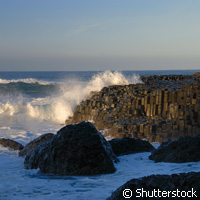Marine and land species on the move in the face of climate change
An international team of scientists has found that organisms either adapt or move to track changes in environments, in both space and time, in order to fight climate change. Presented in the journal Science, the study, focused on ocean warming, shows how climate change is adjusting the average annual and seasonal temperatures on land and water, and is potentially affecting the coastal ecology of Northern Ireland in the United Kingdom. Investigating the travelling speed and direction of marine and land life trying to ensure they maintain their preferred temperatures, the study shows how fish will swim many kilometres while other bio-organisms are prone to stay in place. The data point out that typical spring and autumn temperatures in the water are changing a lot faster than are land temperatures. Researchers from Australia, Denmark, Germany, South Africa, Spain, the United Kingdom and the United States mapped the spread northwards of average sea and land temperatures, which are increasing at a slow pace. According to the team, various marine life and land-based animal and plant species will move by 2062 in order to ensure their survival. The choice locations will be 'fresh comfort zones' around the north coast; these areas will offer ideal temperatures for the various species. In order to assess the potential climate change responses of marine life as regards adjustment and relocation, the researchers used global temperature records, finding that land temperatures have jumped by 1.2°Celsius in the last 50 years while sea temperatures have risen by only a third of that. Their findings indicate that while the temperature increase may seem trivial, the ecological repercussions have already been felt. The data show that bands of temperature are moving polewards: spring temperatures are emerging earlier and autumn temperatures are arriving later. Adding to this problem are the rising levels of global greenhouse gas emissions. 'Our study has very significant global, national and local dimensions,' says study co-leader Dr David Schoeman from the Environmental Sciences Research Institute at the University of Ulster in the United Kingdom, one of the authors of the paper, 'flagging up concern about the future of coral life in parts of the western Pacific Ocean to heightening awareness about the spreading effects of warming around our own coastline.' Dr Michael Burrows of the Scottish Association for Maine Science in the United Kingdom also co-headed the study. Changes in various regions signify the importance of marine creatures responding to the changing climate much more quickly than their land-based counterparts. Commenting on the position of Northern Ireland, Dr Schoeman says: 'The warming ocean should tend to shift species northwards along the Irish east and west coasts, converging on the north Antrim coast. Interestingly, temperatures are moving up the east coast at 5 km to10 km per year but at only half that rate up the west coast. Across the land, temperatures are moving at anywhere between 2 km to 5 km per year in the east to over 20 km per year in the west. This suggests that land-bound species tracking temperature changes could arrive at the coast within decades.' While advances in this field have led to results in recent years, more work still needs to be done, the scientists say. 'We cannot allow out of sight to be out of mind,' the Ulster researcher remarks. 'The sea provides us with many services that society still doesn't fully appreciate, and without an understanding of the changes they are likely to face, we have little capacity to plan.' The team hope to raise awareness of our dependence on marine biodiversity; they are calling for more research funding to provide the knowledge on which long-term response-planning can be based.For more information, please visit: Science: http://www.sciencemag.org/(opens in new window) University of Ulster: http://www.ulster.ac.uk/(opens in new window)
Countries
Australia, Germany, Denmark, Spain, United Kingdom, United States, South Africa



